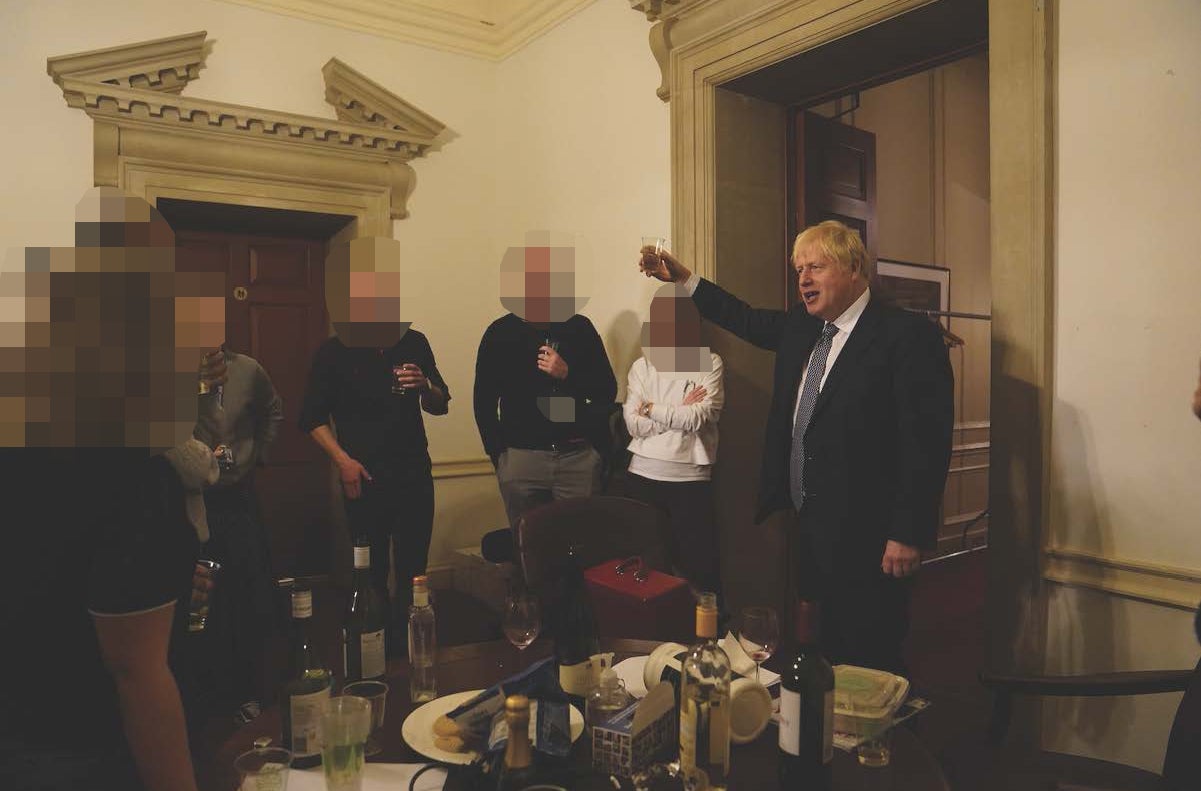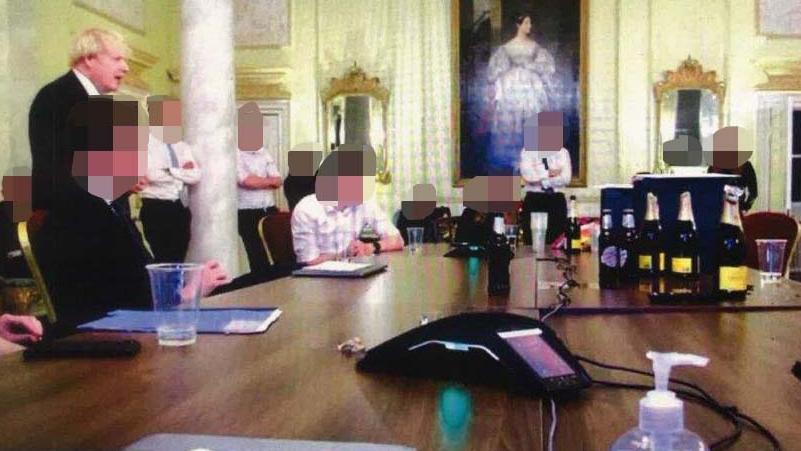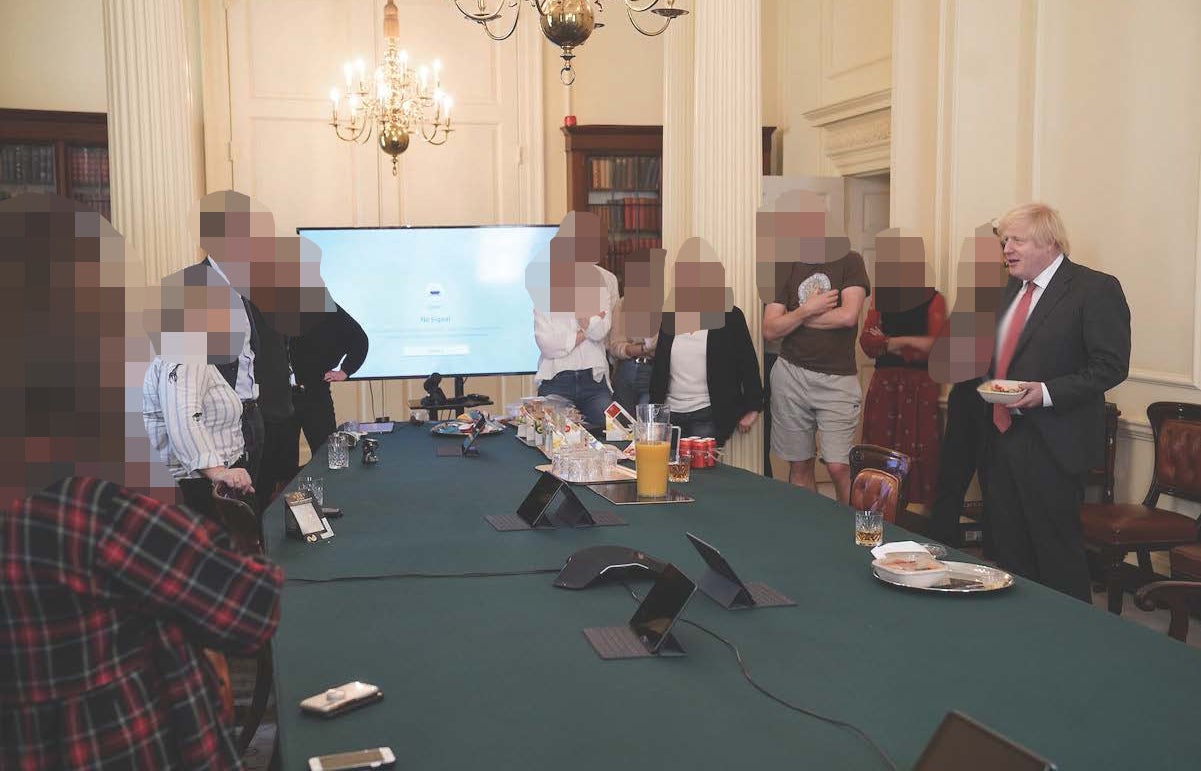Pressure mounts on Boris Johnson over ‘obvious’ Covid breaches at No 10
Official warned No 10 worried ‘about leaks of PM having p***-up’

Boris Johnson faces growing pressure over the Partygate scandal after a parliamentary inquiry said it would have been “obvious” that events he attended in No 10 breached Covid restrictions.
The former prime minister may also have misled the Commons about lockdown parties in Downing Street on four occasions, the cross-party committee said.
But an indignant Mr Johnson insisted the investigation had uncovered “absolutely no evidence” that he had committed any contempt of parliament.
Among the revelations, the interim report from the House of Commons privileges committee found:
- His own communications chief admitted there was a “great gaping hole” in the prime minister’s account of Partygate
- Mr Johnson could see a notorious party spot at the bottom of the stairs leading up to his Downing Street flat
- One No 10 official said a colleague was “worried about leaks of PM having a p***-up and to be fair I don’t think it’s unwarranted”
- There was a “reluctance” from the government to provide the committee with unredacted evidence when Mr Johnson was still prime minister, which held up its inquiry
The report was released as the committee announced a showdown later this month with Mr Johnson, calling him to appear as a witness before MPs.
Labour leader Sir Keir Starmer said the evidence in the report was “pretty damning”.
But he also accused Rishi Sunak of being “very close to all of this” and of sitting “on his hands”. Mr Sunak was fined by police for attending a lockdown-busting birthday gathering for Mr Johnson.
Labour’s deputy leader Angela Rayner also called on Mr Sunak to “stop propping up this disgraced PM and his legal defence fund – and make clear that if he is found to have repeatedly misled parliament his career is over”.
The government has signed off taxpayer-funded legal support to Mr Johnson during the privileges committee investigation worth at least £222,000.
In a statement, Mr Johnson said it was “surreal to discover that the committee proposes to rely on evidence culled and orchestrated by Sue Gray, who has just been appointed chief of staff to the leader of the Labour Party.”

Even ardent allies of Mr Johnson admit his hopes of returning as prime minister depend on him making it through the committee’s investigation. Mr Johnson said the report showed he was “vindicated” as he raised concerns about civil service investigator Ms Gray’s move to Sir Keir’s office.
But the committee insisted its inquiry was “not based on the Sue Gray report” into Partygate but on evidence from witnesses, WhatsApps and emails as well as pictures taken by a Downing Street photographer.
Evidence in the 24-page interim report includes messages between Downing Street then communications director Jack Doyle and a No 10 official discussing the birthday gathering.
Last January, Mr Doyle wrote: “I’m struggling to come up with a way this one is in the rules in my head.”
Responding to a suggestion they describe the event as “reasonably necessary for work purposes”, he replied: “Not sure that one works does it? Also blows another great gaping hole in the PM’s account doesn’t it?’”
In another exchange, a No 10 official said another civil servant was “worried about leaks of PM having a p***-up and to be fair I don’t think it’s unwarranted”.
The report warns: “The evidence strongly suggests that breaches of guidance would have been obvious to Mr Johnson at the time he was at the gatherings.”
It also said there was evidence “that those who were advising Mr Johnson about what to say to the press and in the House were themselves struggling to contend that some gatherings were within the rules”.
The committee said it will consider why the former PM told MPs that no guidance had been broken “when he knew what the guidance was and was in attendance at gatherings where the guidance was breached”.
It will examine his claims in December 2021 that “all guidance was followed completely in No 10” and “the guidance was followed and the rules were followed at all times”.

The committee will also look into “why he failed to tell the House about the gatherings at which he had been present”.
The committee also hit out at the government saying that after requesting “relevant materials” on 14 July last year, on 24 August it received “documents which were so heavily redacted as to render them devoid of any evidential value”.
“Some material had been redacted even though it was already in the public domain,” the report said. The unredacted disclosure of all relevant material was finally provided by Mr Sunak’s government on 18 November.
Mr Johnson will give evidence to the committee in the week beginning 20 March. He has also been invited to provide written evidence to the committee in advance of the session.
Responding to the interim report on Friday night, Jacob Rees-Mogg questioned the decision of the privileges committee to publish the findings before interviewing Mr Johnson, saying it was an “odd way to behave”.
Asked about Mr Doyle’s messages on the birthday gathering, Mr Rees-Mogg added: “The question is, what did the prime minister know at the time? What did he see at the time and what did the rules require?
“You see, once people were at work, there wasn’t a rule that says when you’re at work, you couldn’t eat cake. The rules didn’t go into that level of detail.”
Join our commenting forum
Join thought-provoking conversations, follow other Independent readers and see their replies
Comments




Bookmark popover
Removed from bookmarks